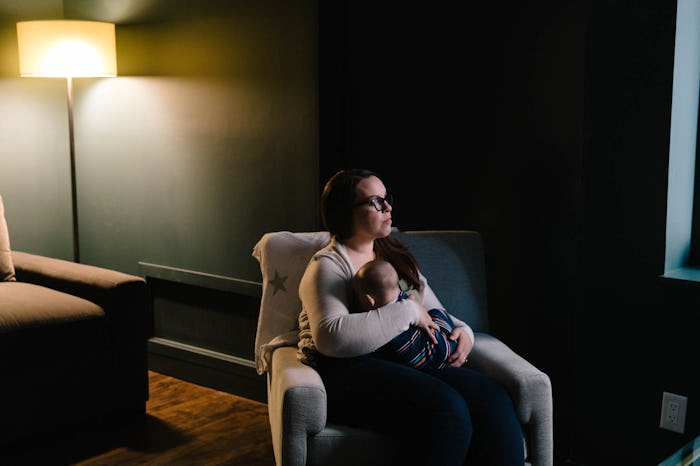Life
Here's How A Traumatic Birth Can Actually Affect You & Your Brain
As a society, we rarely think about birth as a potentially traumatic event. On the contrary, from the baby shower on, birth is nearly always painted in festive, joyful colors. Unfortunately, the truth is that you can be traumatized during birth, and that the cognitive effects of that trauma can stay with you for years. Here's how a traumatic birth affects your brain, and what you should know about the dark side of labor and delivery.
Who experiences birth trauma? According to a study in Nursing Research, "birth trauma is in the eye of the beholder." Even when doctors view a woman's delivery as normal and routine, she might well have experienced a terrifying sense of powerlessness, unbearable pain, or fear for her own or her baby's life. In the worst cases, such severe experiential trauma can result in postpartum post-traumatic stress disorder (PTSD), according to the UK's Birth Trauma Association. Amazingly and terribly, approximately 9 percent of women suffer from PTSD after giving birth, reported Postpartum Support International.
While everyone experiences PTSD differently, anxiety, depression, flashbacks, substance abuse, suicidal thoughts, and persistent mental health and interpersonal problems are all possible symptoms, as the Centers for Disease Control and Prevention (CDC) explained. Such symptoms necessarily impact a person's daily life, sometimes extremely.
Sarah Beaulieu, founder of The Uncomfortable Conversation, tells one story of a traumatic birth and resulting PTSD. As she tells Romper, she was in early labor with her son when hospital staff came rushing into her room. Her baby's heart rate had accelerated, and suddenly two people put their hands inside her body without warning her or receiving her consent. What they didn't know was that Beaulieu is a survivor of childhood sexual abuse, and that their actions would trigger a powerful body memory. "It was very triggering and traumatic," she says. "For the first six months after my son was born, I was in a very raw state." For the next six years after that, she reports feeling constantly hyper-vigilant, or unrelentingly guarded and anxious.
Of course, you don't have to be a survivor of sexual assault to suffer a traumatic birth. Premature deliveries, NICU stays, an unplanned C-section, cord prolapse, postpartum hemorrhage, feelings of powerlessness, and the use of forceps or vacuum extractors are other potential causes, noted Postpartum Support International.
Here's how trauma works at the level of your brain, according to the Royal College of Psychiatrists: "high levels of stress hormones, like adrenaline" can overwhelm your hippocampus, which is responsible for memory. (The Royal College of Psychiatrists described it as "like 'blowing a fuse'" in the memory processing center.) The result is that, physiologically speaking, you never process the traumatic event, but keep living inside it. You might obsessively replay the trauma in your mind, experience intrusive flashbacks and nightmares, or develop life-altering anxiety. Tragically, women who experience postpartum PTSD sometimes struggle to bond with their babies, reported What To Expect.
While it's likely impossible to prevent every case of birth trauma — birth has always been as unpredictable as a battlefield, after all — women are probably suffering from more trauma than they should. Groups like Improving Birth believe that the current medical model of birth, in which women often feel disempowered or are literally silenced, can be changed. And Beaulieu believes that providers should offer resources for survivors of sexual assault, so they're not caught off guard in the labor room. For those already affected by birth trauma or postpartum PTSD, treatment is available, noted What To Expect, so don't be afraid to ask your doctor if you're having trouble processing a birth experience.
Check out Romper's new video series, Bearing The Motherload, where disagreeing parents from different sides of an issue sit down with a mediator and talk about how to support (and not judge) each other’s parenting perspectives. New episodes air Mondays on Facebook.
